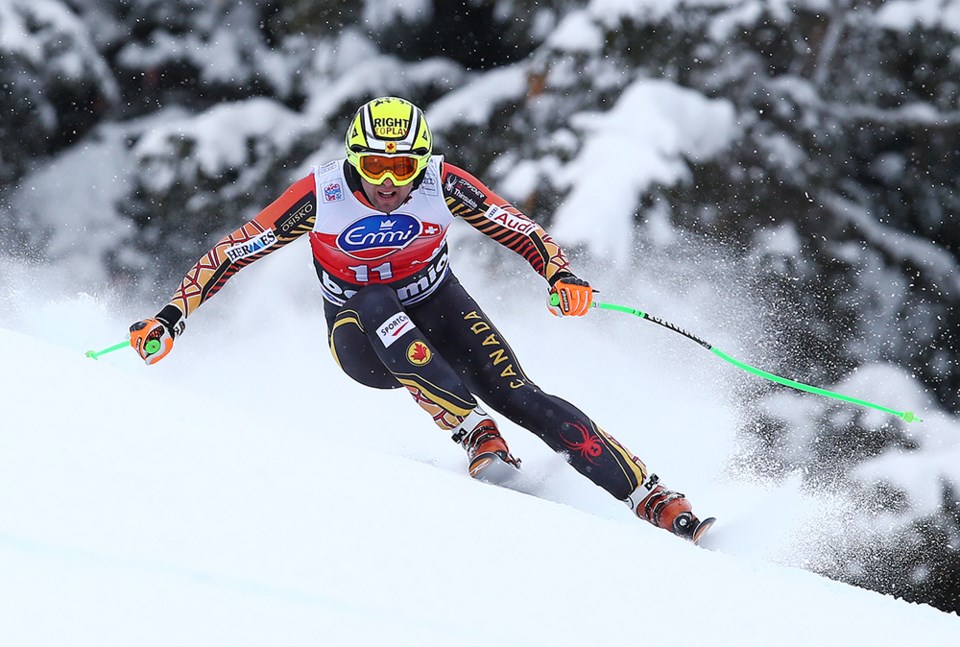This February, downhill skier Manuel Osborne-Paradis has a blind date in Russia.
In the past, Osborne-Paradis has had some relationships go way off track. Now, being a little older and much wiser, the 29-year-old believes his tryst with the Rosa Khutor Alpine Resort at the Sochi Winter Olympics has the potential for a happy ending.
Osborne-Paradis, who calls Vancouver his hometown and is known as Manny, will be competing in his third Winter Games in his 10th year with the Canadian alpine ski team. Just qualifying for Turin in 2006 was a thrill.
The high expectations for the 2010 Games in Vancouver turned into disappointment when his best finish was 17th in downhill.
Now, after missing almost two seasons due to injury, he is taking the maturity he’s earned over the years as well as a new work ethic into Sochi. He’ll need it. He won’t ski the course at the Rosa Khutor Alpine Resort until he arrives on the black Sea coast for the Olympics this February.
“Four years is huge,” said Osborne-Paradis, who has earned a career nine World Cup podium finishes and in 2009 pulled in three wins, two in downhill and one in super giant slalom. “Those are huge time gaps in maturing and really knowing yourself as a skier and as a person. These Olympics, I’ve taken a much more professional approach to my career and my skiing.”
An injury prevented Osborne-Paradis from skiing in the 2012 test event on the Sochi slopes. His first real introduction to the Olympic course will come on the first day of training.
“I’ve raced lots of courses for the first time and done well,” he said. “As I’ve got older, my skiing has improved and my technical skills have improved. I know what the terrain looks like. I have seen the videos and watched others race. I think it’s how you mentally prepare yourself and how confident you are feeling on your skis when you get to the point of the season.”
For much of his career, Osborne-Paradis has been brash, even reckless in his pursuit of winning. One of the sport’s aggressive and exciting Canadian Cowboys, it was an approach that could produce a glowing result or devastating crash.
A brutal fall at Chamonix, France, in January 2011 changed how Osborne-Paradis approached his career. He suffered a broken left fibula and tore the anterior cruciate ligament in his knee and was one of several injured Canucks. That July, while still recovering, Osborne-Paradis made headlines for all the wrong reasons when he jumped onto the back of a moving bus in Calgary and lost his balance.
The six-foot-one athlete was dragged about 80 metres, leaving him with severe road rash and a traffic violation fine.
“It happened, it wasn’t on purpose,” he said. “During the whole process, I became such a better athlete, a better person, a better ambassador of the sport.”
Hopes for a comeback in the 2011-2012 season ended with a ruptured disc in his back. Osborne-Paradis returned healthy last season, but because of his time away had to start races at the back of the field, forcing him to race on courses that were broken down after dozens of runs or in fading light at the end of the day.
The experience made Osborne-Paradis concentrate on skiing as technically sound as possible. It also taught him patience and made him better at assessing risk and plotting strategy. Coming from the back of the pack, he still managed to reach the top 10.
So far this season, Osborne-Paradis just missed two World Cup podiums and finished fourth in a downhill event at Beaver Creek, Colo., and was seventh in Val Gardena, Italy.
“As I got older my technical ability has got way better,” he said. “I think it’s a more competitive way of skiing. The consistency in my skiing is so much better. That’s how you are going to be a contender every weekend.”
Osborne-Paradis said there are “10 to 15” skiers who have a chance at winning the Olympic downhill. He believes he is one of those skiers.
“You need to put yourself in a position to be a contender,” he said. “I would be very depressed if I would be going to the Olympics thinking I was going to have just an OK finish. I’ve had my chance just to go and experience the Olympics. I’m there to be a contender.”
Jim Morris is a veteran reporter who has covered sports for 30 years. Reach him at [email protected].



